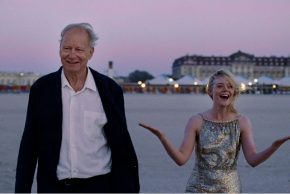Who was Molière? Everyone who listened at school at least a bit can answer: a playwright. Those who listened more can also recall things like the age of baroque, 17th century, the court of the Sun King, the early days of modern theatre. And the most fanatic ones can see a lot of images, from memories of school performances to contemporary theatre experience, and even other writers such as Michail Bulgakov or the Hungarian György Spiró.
Yes, the name of Molière is totally intertwined with a play to be read and to perform on stage. It does not really come to our mind that these comedies were musical pieces initially. The genre comédie-ballet was founded by Molière through an accident. In 1661, he was appointed to showcase a ballet and a textual piece, but he only had a small troupe for both. Work didn’t go well – until Molière realised that he can bring the two tasks together. This is how the first comédie-ballet, Les Fâcheux, was written.
Introducing a new genre is always risky, the reaction of the audience (especially of the funder aristocrat) is unpredictable. Molière had luck though: the king, a fan of ballet, liked the idea of mixing dance, music and text. Comédie-ballet became popular, and Molière was demanded to write twelve more before he died in 1673.
In the Thursday night show of Müpa Home, conductor Gabriel Bebeșelea, his formation Musica Ricercata, and soprano soloist Rodica Vica bring us these collaborations by playwrights and composers. The ensemble, founded in 2017, has the goal of showcasing early music in a historically accurate way, also involving the mixture of several genres. The current concert video was recorded in 2018 at the Early Music Festival. The composers we can hear here are also popular in their own right, we can often listen to their works in concert halls, opera stages and at festivals, and now they can meet their old friend Molière, just like other writers of the era.
The first three pieces commemorate the cooperation between Molière and Jean-Baptiste Lully. After their first work, which was Les Fâcheux mentioned above, they also worked on many other things. Now we can hear parts of Le Bourgeois gentilhomme, L’Amour médecin, and George Dandin, ou le Mari confondu. Then here comes another partner of Molière, Marc-Antoine Charpentier: he wrote music for Le malade imaginaire, the one that became the final performance in Molière’s life, as he got ill on stage and died later that day. Now we can hear this, and also another piece, Le mariage forcé, from the joint workshop of the two creators.
At this point we need to say goodbye to Molière, but not the concert! We just run a bit forward in time, so that we can also hear a bit of early 18th century baroque music. Two pieces will be played, both by composer Jean-Philippe Rameau, and both premiered in 1745. The librettist of the opera Platée was the popular comedy- and parody-writer of the era, Adrien-Joseph le Valois d’Orville. Some say that this is the most beloved opera by Rameau, which was praised by even such people of his age who otherwise did not like his other works. And the text for La Princesse de Navarre, which celebrated the engagement of Louis the Dauphin with Maria Teresa Raffaela of Spain, was written by no one else but Voltaire.
Three composers, three writers, seven special collaborations. Musica Ricercata brings history to life – it is history of music, history of theatre, and also looks like a history of friendship across art forms, and inspiration across ages.
The free broadcast can be seen on 29th April 2021, 7:30 onwards, on the Müpa website and YouTube channel.

























Comments